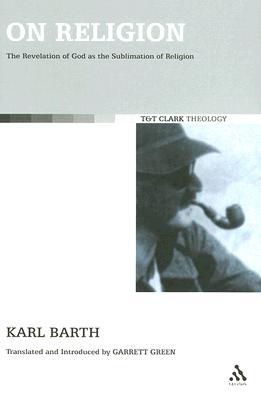- Biblia
- Leer la Biblia
- Versiones de la Biblia
- Verso del dia
- Planes de lectura
- Versos por tema
- Books of the Bible
- Imágenes De La Biblia
- Estudio
- Comentarios
- Concordancias
- Diccionarios bíblicos
- Enciclopedias bíblicas
- Sermones
- Bible Atlas & Maps
- BP Wiki
- Devocionales
- Devocionales de hoy
- Light of the World
- Todos los devocionales
- Inspirational Quotes
- Más
- Picture Quotes
- Videos
- Inspirador
- Estudio Bíblico
- Lo que dice la Biblia
- Bible Q&As
- Daily Bread
- Bible by Genre
- Bible Stories
- Random Bible Verse
- Comunidad
- Store
The study Karl Barth has generally been excluded from religious studies departments in favour of more liberal theologians such as Tillich. For many years scholar Garrett Green has argued that there is no justification for this neglect. To support his theory that Barth can and should be studied as a religious theorist rather than just a theologian Garrett Green presents a brand new translation of Chapter 17 of Karl Barth's Church Dogmatics prefaced by a detailed introduction to the text.The study Karl Barth has generally been excluded from religious studies departments in favour of more liberal theologians such as Tillich. For many years scholar Garrett Green has argued that there is no justification for this neglect. To support his theory that Barth can and should be studied as a religious theorist rather than just a theologian Garrett Green presents a brand new translation of Chapter 17 of Karl Barth's Church Dogmatics prefaced by a detailed introduction to the text.
This important new translation counters the idea that Barth rejected the notion of religion out of hand by correcting a number errors in the original version which obscure Barth's central argument. In particular the crucial word, Aufhebung, in the title is translated here as sublimation rather than abolition. The translation will do better justice to the German original and will be more accessible to contemporary readers. Unlike the original version, all Greek, Latin and Hebrew citations are translated into English, and the NRSV is used for the Bible quotes rather than the King James.This important new translation counters the idea that Barth rejected the notion of religion out of hand by correcting a number errors in the original version which obscure Barth's central argument. In particular the crucial word, Aufhebung, in the title is translated here as sublimation rather than abolition. The translation will do better justice to the German original and will be more accessible to contemporary readers. Unlike the original version, all Greek, Latin and Hebrew citations are translated into English, and the NRSV is used for the Bible quotes rather than the King James.
The translation is accompanied by a text by Garrett Green introducing the scholar and student to Barth as a religious theorist. The book concludes with appendices containing teaching materials and a summary of developed by the author in the classroom over years.The translation is accompanied by a text by Garrett Green introducing the scholar and student to Barth as a religious theorist. The book concludes with appendices containing teaching materials and a summary of developed by the author in the classroom over years.
Paperback, 176 pages
Published January 1st 2007 by Bloomsbury T&T Clark (first published November 1st 2006)
Suscribir
© 2025 Bibleportal.com Reservados todos los derechos.

Karl Barth was a Swiss Reformed theologian whom critics hold to be among the most important Christian thinkers of the 20th century.
Beginning with his experience as a pastor, he rejected his training in the predominant liberal theology typical of 19th-century Protestantism. Instead he embarked on a new theological path initially called dialectical theology, due to its stress on the paradoxical nature of divine truth (e.g., God's relationship to humanity embodies both grace and judgment). Other critics have referred to Barth as the father of neo-orthodoxy -- a term emphatically rejected by Barth himself. The most accurate description of his work might be "a theology of the Word." Barth's theological thought emphasized the sovereignty of God, particularly through his innovative doctrine of election.
Barth tries to recover the Doctrine of the Trinity in theology from its putative loss in liberalism. His argument follows from the idea that God is the object of God's own self-knowledge, and revelation in the Bible means the self-unveiling to humanity of the God who cannot be discovered by humanity simply through its own efforts.
... Show more